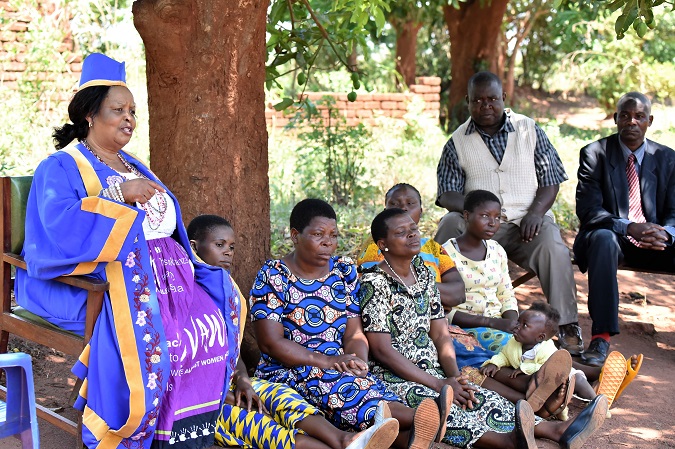Take 5: 'Parents please don’t marry off your children, send them to school instead'
Date:

Senior Chieftainess Chikumbu assumed the chieftaincy after the death of her mother in 2009 and was officially inaugurated in 2011. A teacher by profession, she taught at several primary schools in South Lunzu and Blantyre, Malawi. She retired in 2011 to take up the chieftaincy where she oversees 142 chiefs under her jurisdiction. A champion against gender-based violence and early childhood marriages, Chieftainess Chikumbu has rescued over 2000 young girls from child marriage. UN Women works with Chieftainess Chikumbu among others to build their capacity to address child marriage among other gender inequality challenges in their areas. She spoke to Patterson Siema of UN women.
Why are you addressing child marriage in your area?
I am a teacher by training and in my teaching profession I saw girls getting married off at a very early age and this caused me so much pain. I tried to rescue some of those children, but my hands were tied as I did not have the authority to annul any marriage. However, once I became chief in the year 2011, I had the authority and resolved to address the problem of child marriage in my area.
Did you face any challenge from the community?
Yes, there was resistance, but I summoned the Area Development Committee (a local decision-making organ for the chief) and sensitized them on the negative effects of child marriage and together we resolved to end child marriage. I also used myself as an example. One can be a successful teacher, doctor or banker if only they have access to education. With the right education, a girl can become successful and support the family or community, but if she is married early, she will not go to school. So, we should allow our children to go to school and not into marriage.
What was encouraging child marriage within your jurisdiction?
When asked this question, most people respond by saying poverty, some said it was because of peer pressure, while others said it was because of culture and tradition. I reminded the people that there is no culture and or tradition that encourages such violence against children in the form of child marriage. We had to carry out a lot of sensitization within the community and bring in role models who would speak to the girls on why they should not get into marriage at an early stage.
After the sensitization, we formed by-laws on child marriage in my area of jurisdiction. The Area Development Committee jointly with other stakeholders including the police and the judiciary developed the by-laws which were approved by the government. Awareness about the by-laws were then disseminated through village heads and a local community radio where emphasis was placed on ending child marriage. We are seeing some success because violations of these by-laws carry heavy fines; an effort to create a deterrent effect on potential violators.
The fines also apply to the village heads if the girl is married in his or her area of jurisdiction holding them accountable.
What happens to the rescued girls?
The children are integrated within the community, in some cases counselling is offered to the parents. We ask them to allow the children to go back to school. I also offer to pay the school fees and buy books, writing materials and school uniform for the girls.
So far, we have saved 2,002 girls from child marriages. Out of the rescued girls, 800 girls have gone back to school and I am happy about it. Some have even gone to colleges and university and I am proud because of these achievements.
What is your final message to the children and parents?
Parents please don’t marry off your children, send them to school instead. If you educate a girl child, you have educated a whole nation. We must save the girls from marriages, they must go to school. Once they are married they will be trapped into perpetual poverty.